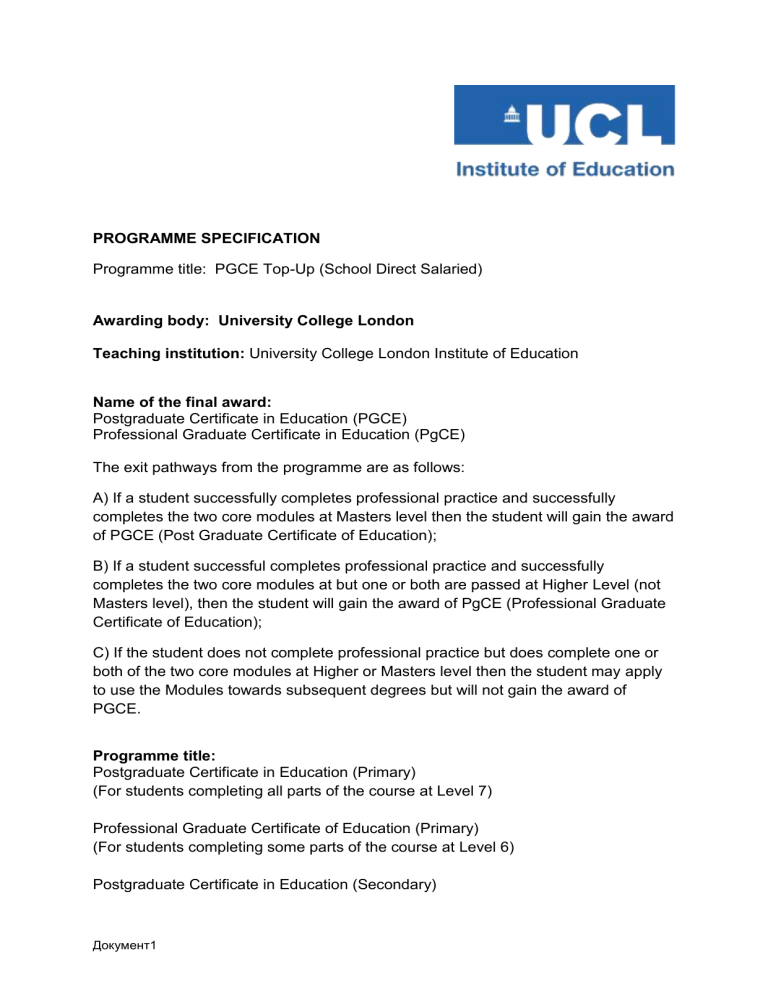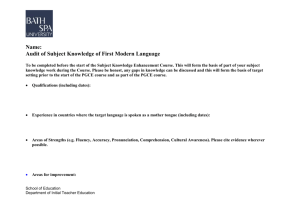Document 13842976

PROGRAMME SPECIFICATION
Programme title: PGCE Top-Up (School Direct Salaried)
Awarding body: University College London
Teaching institution: University College London Institute of Education
Name of the final award:
Postgraduate Certificate in Education (PGCE)
Professional Graduate Certificate in Education (PgCE)
The exit pathways from the programme are as follows:
A) If a student successfully completes professional practice and successfully completes the two core modules at Masters level then the student will gain the award of PGCE (Post Graduate Certificate of Education);
B) If a student successful completes professional practice and successfully completes the two core modules at but one or both are passed at Higher Level (not
Masters level), then the student will gain the award of PgCE (Professional Graduate
Certificate of Education);
C) If the student does not complete professional practice but does complete one or both of the two core modules at Higher or Masters level then the student may apply to use the Modules towards subsequent degrees but will not gain the award of
PGCE.
Programme title:
Postgraduate Certificate in Education (Primary)
(For students completing all parts of the course at Level 7)
Professional Graduate Certificate of Education (Primary)
(For students completing some parts of the course at Level 6)
Postgraduate Certificate in Education (Secondary)
Документ1
(For students completing all parts of the course at Level 7)
Professional Graduate Certificate of Education (Secondary)
(For students completing some parts of the course at Level 6)
UCAS/admission code:
Criteria for admission to the programme:
All candidates should have met the entry criteria for School Direct (Salaried) at University College London Institute of Education:
All candidates must be fully enrolled on the School Direct (Salaried) route at
University College London Institute of Education;
All candidates must be on track to gain Qualified Teacher Status through the
School Direct (Salaried) route at point of admission;
In order to progress, all candidates must have gained Qualified Teacher
Status at the end of their School Direct (Salaried) programme.
Aims of the programme
This programme is designed to enable existing training teachers on the School Direct
(Salaried) route which lead QTS without a PGCE to gain a formally recognised qualification which sits alongside their professionally recognised status as being qualified to teach.
The primary aim of this programme is to train candidates to be high quality teachers for schools in London and the UK. Therefore this PGCE programme aims to:
Maintain the highest academic and professional standards for new teachers entering the teaching profession;
Provide a rich and rewarding experience of initial teacher education in the university and schools so as to enhance and encourage commitment, continuity and retention of teachers as professional practitioners;
Maintain a commitment to social equity and social justice for the whole range of school students, teachers and schools, working towards a culturally diverse society in which the rights and responsibilities of all are recognised and promoted in teaching and learning;
Provide an excellent basis for professional practice in teaching and as a classroom practitioner that meets and extends beyond the statutory requirements of the Standards for QTS;
Consolidate and extend the knowledge of curriculum subjects and pedagogy appropriate to the range of school students across the phases of compulsory schooling and beyond this to post-compulsory teaching and learning;
Ensure that teaching and professional practice as a classroom teacher is based on current, recent and relevant research and publication;
Документ1
Promote habits of critical reflections on practical teaching as well as theories and policies that underpin the professional practice of Primary and Secondary teachers;
Promote a commitment to maintaining the career-long, continuing, professional learning and development of Primary and Secondary teachers;
Consolidate and extend subject knowledge required by the statutory and postcompulsory curriculum;
Acquire and extend of teaching, practical pedagogical knowledge and skills appropriate to the diverse range of school students;
Commitment to and aspiration towards excellence in education and schooling for the complete range of schools students;
Instil and maintain an aspiration for constant improvement of professional practice as a teacher;
Provide a critical, research and enquiry-led approach to teaching and learning.
Relevant subject benchmark statements and other external and internal reference points used to inform programme outcomes
For a PGCE students must achieve at level 7 (Masters Level)
. However a student’s work will also be assessed at level 6 if it fails to pass at Level 7. The exit award will change if any part of the course is passed at Level 6 (as opposed to Level 7) (see above).
If any piece of a student’s work fails the assessment at Level 7, but is passed at Level 6 the students will be able to resubmit the work for consideration at
Level 7 should they wish.
At H level participants will:
explore professional practice and knowledge through reflection.
have systematic understanding of basic leadership concepts
develop professional knowledge and skills in leading teams and developing their own leadership
apply their own understanding to different concepts and ideas within leadership and management
At M level participants will also :
demonstrate critical reflection and make significant connections between practice and relevant literature.
show some originality in their engagement with their study
demonstrate a critical awareness of the current debate within leadership theory
demonstrate an ability to reflect and entertain discourse of alternative viewpoints within leadership development and team leadership.
Programme outcomes:
The principal learning outcomes are:
Документ1
Understanding the key aspects of the field of study and practice through:
A grasp of issues and critical insight into teaching and professional pedagogic practice
Understanding the learning processes and the contexts of learning and teaching
The ability to be creative, independent and successful in the application of knowledge in teaching and other work with a range of learners and colleagues
Able to explore, analyse, discuss and reflect on teaching and learning, demonstrated by:
A capacity to analyse teaching and learning within immediate and wider professional context
Ability to draw from and apply appropriate intellectual perspectives to teaching and learning
Professional knowledge refined through critical reflection and engagement with research and scholarship
Understanding and analysis of values underpinning or influencing pedagogic approaches.
The ability to communicate and make structured presentations that demonstrate:
The choice of appropriate forms of communication and presentation
Clarify, focus and coherence in communication and presentation.
Teaching, learning and assessment strategies to enable outcomes to be achieved and demonstrated
The programme assessment strategies draw from the Student Teachers’ professional practice in schools and colleges. The assignments provide the opportunity for the
Student Teacher to bring together theory and practice through linking the research literature, their reflection and evaluation of practical teaching and the wider educational context including their school, the London region and recent policies in education.
Most assignments are in more than one part and some include alternative methods of assessment such as the evaluation of original teaching resources and presentations.
Programme structures and requirements, levels, modules, credits and awards
All students will complete two Masters modules of 30 credits each.
Документ1
The two modules have been designed to encourage critical engagement with teaching and learning, both whilst training and into the beginning of a career as a practitioner.
The delivery mode and assignment patterns have been constructed to work with, and enhance, the other elements of the course.
The Professional Learning Portfolio (PLP) module will enable students to reflect on their experiences throughout the course and will prepare them for the ongoing process of building a portfolio which is part of a teacher’s professional development. The students will collect evidence of their developing practice and be encouraged to engage in discussion about this evidence with peers. The portfolio will consist of four pieces of reflective writing that make reference to the evidence they have collected and draw on readings that are part of the course.
The Understanding Teaching (UT) module is designed specifically for new teachers in either their first of second year of teaching, and hence will start after the completion of the School Direct Salaried programme when students are in their initial year of teaching. Acknowledging this busy early stage of a teaching career it is run over a complete academic year with a mix of online discussions and face to face (f2f) sessions once a term. It is multi-phase (primary and secondary) and multi subject and uses online group discussion of key issues, with participant's personal teaching contexts being central in this process. The module enables students to engage critically with aspects of school-based practice and pedagogy.
Mode of study: Full Time
Language of study: English
Date at which the programme specification was written or revised. Initials of author.
30 September 2015 (JR)
Amendments 22 October 2015 (JR)
ASQEU (BP) 14 October 2014 updated ASQEU (RC) July 2015
Документ1





